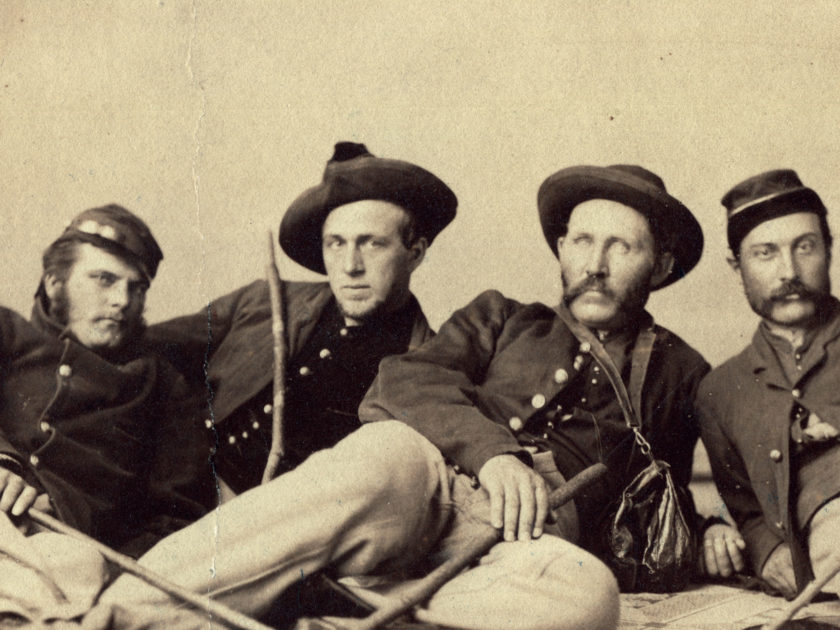Edmund Rice is a familiar figure to many students of the Civil War. A Massachusetts surveyor at the beginning of hostilities, he worked his way up from captain to brigadier general in the Union army. Upon his death in 1906, he left a rich legacy that included the Medal of Honor for his actions in repelling Pickett’s Charge at Gettysburg. He also left a number of portrait photographs. Many were published in 2006 in this magazine—a unique collection of images that documented his military service over four decades, presented by Rice’s great-great-great grandson, Steven J. Nitch.

Albumen attributed to Michael Witt of Columbus, Ohio. Rick Carlile Collection.
One of the images not included is the large format albumen, pictured here, shows Rice casually posed with fellow officers. Though the photographer is not identified, a similar carte de visite of the four men owned by Nitch bears an attribution to photographer Michael Witt of Columbus, Ohio.
The event that explains how Rice came to have his picture taken with these men occurred about a year after the Battle of Gettysburg.

On May 12, 1864, then Lt. Col. Rice of the 19th Massachusetts Infantry was wounded and captured during the brutal fighting at the “Bloody Angle,” also known as the “Mule Shoe Salient,” at Spotsylvania. Eleven days later, on the evening of May 23, Rice and five other prisoners escaped through the slat door of a moving box car about 30 miles outside Danville, Va. One man disappeared, while another was recaptured soon after the escape. The remaining four carefully made their way to the North. According to a report in the New York Times, “They took to the swamps and kept in them and in the mountains for twenty-seven days, before they reached our lines—remaining concealed during the day and traveling in the night.”
The quartet arrived in Somerville, W.Va., and was forwarded to Columbus, Ohio, where they posed for this portrait. “By orders from the War Department, they were furnished with clothing, advance pay, and had a furlough of thirty days granted them,” noted the Times.
The former prisoners returned to their commands after the conclusion of their furloughs. Rice was promoted to colonel and continued on in the regular army, retiring as a brigadier general in 1903. Capt. Delos Phillips of the 17th Michigan Infantry mustered out of the regiment in October 1864. He died in Ypsilanti, Mich., in 1887. Second Lt. Harrison Berdan of the 5th Michigan Cavalry, the half-brother of famed sharpshooter commander Hiram Berdan, ended his service as captain and lived until 1923. First Lt. Benjamin Delos Safford of the 17th Michigan Infantry later advanced to captain, and ended the war with a brevet rank of major. He settled in Detroit after the war and died in 1920.

